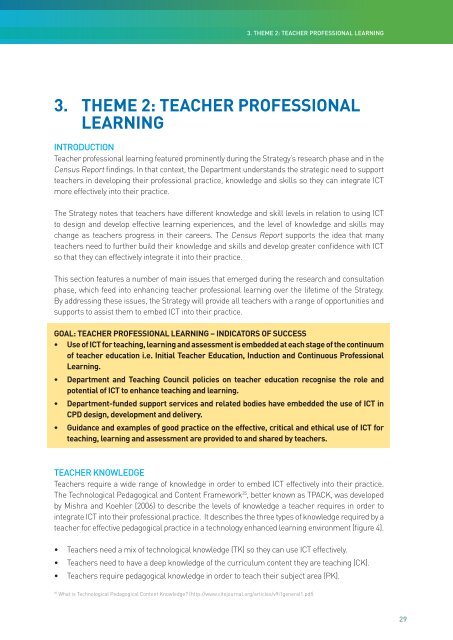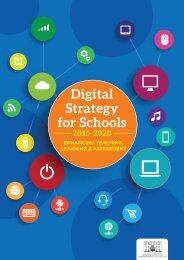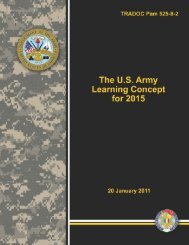Digital Strategy for Schools
TKmc0
TKmc0
Create successful ePaper yourself
Turn your PDF publications into a flip-book with our unique Google optimized e-Paper software.
3. THEME 2: TEACHER PROFESSIONAL LEARNING<br />
3. THEME 2: TEACHER PROFESSIONAL<br />
LEARNING<br />
INTRODUCTION<br />
Teacher professional learning featured prominently during the <strong>Strategy</strong>’s research phase and in the<br />
Census Report findings. In that context, the Department understands the strategic need to support<br />
teachers in developing their professional practice, knowledge and skills so they can integrate ICT<br />
more effectively into their practice.<br />
The <strong>Strategy</strong> notes that teachers have different knowledge and skill levels in relation to using ICT<br />
to design and develop effective learning experiences, and the level of knowledge and skills may<br />
change as teachers progress in their careers. The Census Report supports the idea that many<br />
teachers need to further build their knowledge and skills and develop greater confidence with ICT<br />
so that they can effectively integrate it into their practice.<br />
This section features a number of main issues that emerged during the research and consultation<br />
phase, which feed into enhancing teacher professional learning over the lifetime of the <strong>Strategy</strong>.<br />
By addressing these issues, the <strong>Strategy</strong> will provide all teachers with a range of opportunities and<br />
supports to assist them to embed ICT into their practice.<br />
GOAL: TEACHER PROFESSIONAL LEARNING – INDICATORS OF SUCCESS<br />
• Use of ICT <strong>for</strong> teaching, learning and assessment is embedded at each stage of the continuum<br />
of teacher education i.e. Initial Teacher Education, Induction and Continuous Professional<br />
Learning.<br />
• Department and Teaching Council policies on teacher education recognise the role and<br />
potential of ICT to enhance teaching and learning.<br />
• Department-funded support services and related bodies have embedded the use of ICT in<br />
CPD design, development and delivery.<br />
• Guidance and examples of good practice on the effective, critical and ethical use of ICT <strong>for</strong><br />
teaching, learning and assessment are provided to and shared by teachers.<br />
TEACHER KNOWLEDGE<br />
Teachers require a wide range of knowledge in order to embed ICT effectively into their practice.<br />
The Technological Pedagogical and Content Framework 35 , better known as TPACK, was developed<br />
by Mishra and Koehler (2006) to describe the levels of knowledge a teacher requires in order to<br />
integrate ICT into their professional practice. It describes the three types of knowledge required by a<br />
teacher <strong>for</strong> effective pedagogical practice in a technology enhanced learning environment (figure 4).<br />
• Teachers need a mix of technological knowledge (TK) so they can use ICT effectively.<br />
• Teachers need to have a deep knowledge of the curriculum content they are teaching (CK).<br />
• Teachers require pedagogical knowledge in order to teach their subject area (PK).<br />
35<br />
What is Technological Pedagogical Content Knowledge? (http://www.citejournal.org/articles/v9i1general1.pdf)<br />
29




